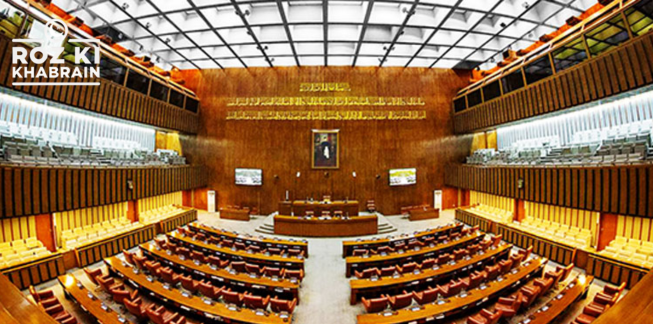After multiple delays and much controversy, the 26th Constitutional Amendment Bill was finally presented in the Senate on Sunday by Law Minister Azam Nazeer Tarar, following its approval by the federal cabinet.
Commonly referred to as the Constitutional Package, the bill introduces several constitutional amendments, including an extension of the chief justice’s term. A special parliamentary committee, formed last month and comprising representatives from all political parties, including the PTI, has been discussing various proposals.
Shortly after the cabinet’s approval, Law Minister Tarar presented the bill in the Senate, stating, “I wish to introduce a bill to amend the Constitution of the Islamic Republic of Pakistan, the Constitution 26th Amendment Bill, 2024.”
Senate Chairman Yousaf Raza Gilani asked if there was any opposition to the bill, but received no response.
According to a statement from the Prime Minister’s Office, the cabinet approved the bill “in the wider interest of the country, while remaining committed to national development and public welfare.”
Before the Senate session, Law Minister Tarar, accompanied by Information Minister Attaullah Tarar, held a press conference at Parliament House. He outlined the bill’s key points, including the formation of a constitutional bench by a judicial commission led by the Chief Justice of Pakistan (CJP).
Tarar explained that prior to the 18th Amendment, judges were appointed by the President on the Prime Minister’s advice. The new commission would include the CJP, four senior Supreme Court judges, two senators, and two MNAs, with one from the opposition in each group. Tarar emphasized that the goal was to achieve a broader consensus with this commission, and that he and the attorney general would also serve as members.
He also highlighted plans for appointing members from marginalized communities, women, and minorities, as well as introducing a technocrat for expert input. Additionally, a performance evaluation system for provincial judiciary judges was proposed, aiming to address the long-standing issue of delayed cases and ensure accountability.
Meanwhile, the PTI stated that while it had no objections to the final draft of the bill, the party had decided to abstain from voting. PTI leader Zulfi Bukhari confirmed the party would attend both sessions of parliament but would not vote, recording their protest instead.
PTI Chairman Barrister Gohar Ali Khan reiterated this stance, explaining that their leader, Imran Khan, had recommended further consultations, which were not possible due to the bill’s fast-tracking and the alleged harassment of PTI members. Gohar expressed gratitude to JUI-F Chief Maulana Fazlur Rehman for his role in the process but emphasized that the party would not participate in the vote.
Fazlur Rehman, during a press conference, acknowledged the PTI’s decision, stating it was their right to abstain given the challenges they faced. He expressed his understanding and acceptance of the party’s position.
In contrast, PPP Chairman Bilawal Bhutto-Zardari declared that the government would proceed with or without PTI’s support. Speaking to reporters at the Senate, Bilawal said the bill’s passage would be completed that day, expressing disappointment at the PTI’s stance but remaining hopeful that consensus could still be achieved.




